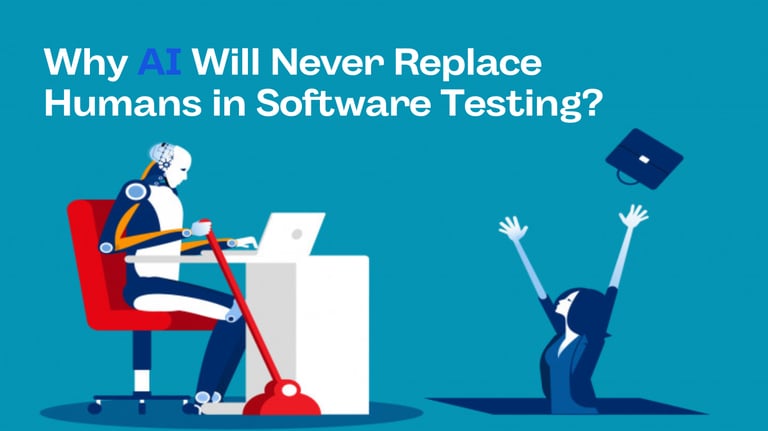Kickstart Your IT Career with MindScripts Tech! 🚀 Expert-Led Training | 3 Days Free Demo | 100% Placement Assistance | Join 1500+ Company Tie-Ups Today! Ready to Succeed? Let’s Begin!
Why AI Will Never Replace Humans in Software Testing?
In recent years, the integration of Artificial Intelligence (AI) into various industries has sparked discussions about its potential to replace human jobs.
MindScripts Tech
3/18/20243 min read


Introduction:
In recent years, the integration of Artificial Intelligence (AI) into various industries has sparked discussions about its potential to replace human jobs. Software testing, a crucial aspect of software development, is often considered a prime candidate for AI-driven automation. However, despite advancements in AI technology, there are several reasons why humans will continue to play an irreplaceable role in software testing. Let's delve into ten points, each supported by an example, which will help us understand why AI will never fully replace human testers.
1. Contextual Understanding:
AI lacks the refined understanding of real-world contexts that human testers possess. For instance, consider a localization bug where a particular feature behaves differently based on cultural or linguistic factors. A human tester would recognize the importance of such nuances and test accordingly.
Example: Imagine a software application designed for global use. While an AI might detect functional bugs, it might overlook issues related to language nuances or cultural preferences. Human testers can identify such issues and provide valuable insights.
2. Creative Problem-Solving:
Software testing often requires creative problem-solving skills to anticipate and uncover potential issues that may not be obvious. Humans excel in thinking outside the box and devising unconventional testing scenarios.
Example: Suppose there's a navigation bug in a mobile app that occurs only under specific user interaction patterns. Human testers can explore various usage scenarios and identify the root cause, whereas AI might struggle without predefined patterns.
3. User Experience Evaluation:
Understanding user experience details requires human intuition and empathy, which AI currently lacks. Human testers can provide qualitative feedback on aspects like intuitiveness, aesthetics, and emotional appeal.
Example: In a web application, automated tests may validate functionality, but only human testers can gauge the frustration users might feel when encountering a confusing user interface or an overly complex workflow.
4. Adapting to Changes:
Software development is dynamic, with frequent changes in requirements, design, and technology. Human testers are adept at adapting testing strategies on the fly to accommodate such changes.
Example: If there's a sudden change in project requirements, human testers can quickly adjust testing priorities and strategies to ensure thorough coverage. AI-based testing tools might struggle to adapt without significant retraining.
5. Exploratory Testing:
Exploratory testing involves simultaneous learning, test design, and test execution. It relies heavily on human intuition, creativity, and domain knowledge to uncover unexpected issues.
Example: During exploratory testing, a human tester might discover a critical security vulnerability by intuitively probing different system inputs, something an AI-driven tool might overlook due to its programmed focus on predefined test cases.
6. Domain Expertise:
Certain domains require deep domain expertise to effectively test software. Human testers with domain knowledge can identify domain-specific edge cases and potential pitfalls.
Example: In the medical field, testing software for healthcare applications demands a detailed understanding of medical procedures, regulations, and patient safety concerns. Human testers with medical backgrounds can uncover critical issues that AI might miss.
7. Emotional Intelligence:
Dealing with software development teams requires emotional intelligence, especially when communicating issues and collaborating for solutions. Humans excel in building rapport and fostering teamwork.
Example: When reporting a critical bug, human testers can communicate its severity effectively, considerate of the developers' efforts, and collaborate towards a resolution. AI lacks this emotional intelligence.
8. Ethical Considerations:
Testing involves ethical considerations, such as data privacy, security, and accessibility. Human testers can critically evaluate these aspects and ensure that software meets ethical standards.
Example: A human tester might notice potential privacy violations when handling user data, whereas an AI might overlook such concerns, leading to legal and reputational risks for the company.
9. Intuition and Gut Feel:
Sometimes, testers rely on intuition or gut feeling to guide their testing efforts, especially when faced with ambiguous requirements or subtle indications of potential issues.
Example: In a situation where all automated tests pass, but there's a lingering feeling that something isn't quite right, a human tester's intuition might lead to the discovery of a latent bug that AI-driven tests missed.
10. Continuous Learning and Improvement:
Human testers continuously learn and improve their skills over time, adapting to new technologies, methodologies, and industry trends, which is challenging for AI to replicate.
Example: A seasoned human tester might adopt new testing techniques or tools to address emerging challenges, whereas AI requires deliberate retraining efforts to incorporate new knowledge effectively.
In conclusion, while AI undoubtedly enhances efficiency and scalability in software testing, it cannot replace the unique abilities and insights that human testers bring to the table. The future of software testing lies in harnessing the complementary strengths of both humans and AI, leveraging technology to augment human expertise rather than supplanting it entirely.
Artificial intelligence can improve the efficiency of software testing, but it can never completely replace human testers in the field due to the irreplaceable human skills of contextual comprehension, creative problem-solving, and empathic user experience review.
Begin your Software Testing career with MindScripts Tech!
Enroll in our Software Testing course right away to take advantage of
limitless employment options in the technology sector.



At MindScripts Tech, our mission is to empower individuals through cutting-edge IT education, bridging theory with practical skills. We cultivate innovation, nurture creativity, and prepare our students to thrive in the dynamic IT industry, fostering a globally competitive workforce.
